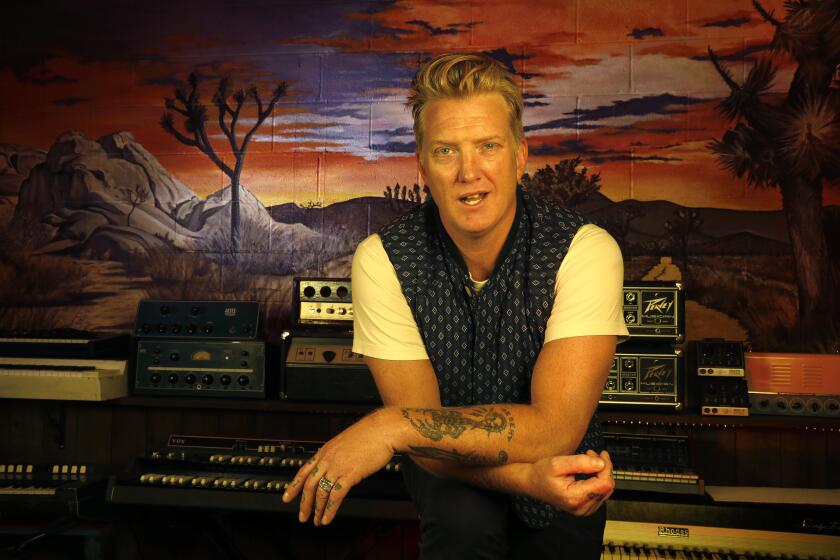A solo singer but also part of a larger chorus
The queen of Caribbean vocalists is on the phone from Poland, chatting about a subject much on her mind lately: gratitude. “I am thankful for many things,” Omara Portuondo said in brisk, Cuban-accented Spanish, and at 78 she has good reason to be.
For starters, the principal chanteuse of the Buena Vista Social Club this year is celebrating her sixth decade as an entertainer. Long before Fidel Castro became a Communist, Portuondo was hoofing up a storm as a dancer at the Tropicana Club in Havana.
Her subsequent career as a solo singer, which began in the 1960s, has partnered Portuondo with a cross-section of Latin American musical luminaries. That venturesome spirit of collaboration extends to her latest disc, fittingly titled “Gracias,” released today.
“Gracias” includes tracks in which Portuondo doubles up with Chico Buarque, the Brazilian Renaissance man of performing arts; the Cuban singer-songwriter Pablo Milanes, co-founder of the so-called nueva trova style of politicized progressive-folk music; and Chucho Valdes, the Cuban bandleader, pianist and composer.
Portuondo has known some of these artists, such as Valdes and Buarque, for decades. Other relationships were formed more recently, as with Jorge Drexler, the Uruguayan singer-songwriter who won an Academy Award for composing the song “Al Otro Lado del Rio” (The Other Side of the River) for the 2004 Che Guevara biopic, “The Motorcycle Diaries.” He and Portuondo harmonize on the record’s title track. “It was very beautiful, because he’s a very agreeable person, very gentle,” she said.
Although some tracks on “Gracias” -- such as the classic “Adios Felicidad” (Goodbye Happiness) -- have a melancholy timbre, the record is decidedly upbeat. Its spare, mainly guitar-driven arrangements, with a smattering of lush strings, frame Portuondo’s suavely insistent voice.
If any further proof were needed that Portuondo is still a vibrant contemporary performer, not a nostalgia act, in 2008 she put out another disc of duets with Brazilian singer Maria Bethania that earned a Latin Grammy nomination. Capping the year for Portuondo was the release of “Buena Vista Social Club at Carnegie Hall,” a live 1998 recording that captures the resurgent skills of the veteran Cuban musicians not long after Ry Cooder helped give them worldwide exposure by bringing them together to record with him.
Portuondo has been celebrating various milestones this fall with an extensive tour that has taken her this month to Eastern Europe, where she has long commanded a loyal following. “The people know the Buena Vista Social Club, and they know the songs,” she said.
The sense of thankfulness that gave rise to “Gracias” springs from multiple sources. Portuondo wanted to acknowledge the many people who’ve inspired her: her parents, her fellow musicians and Cooder, whose Buena Vista Social Club project spurred a revival of interest in Cuban music.
The timing of “Gracias,” as well as its contents, tacitly acknowledges that many artists of Portuondo’s generation already have passed from the scene. Three of the Buena Vista Social Club’s principals, Ibrahim Ferrer, Compay Segundo and Ruben Gonzalez, have died in recent years. Pio Leyva, a former backing singer to Beny More and a kind of auxiliary Buena Vista Social Club member, suffered a fatal heart attack in 2006.
“It makes me feel very bad,” Portuondo told an interviewer for El Nuevo Herald last month. “You know the anguish that is provoked by the leaving of loved ones, but we already know that all of us have to die.”
The last several months have been tough on Cuba. Hurricanes Ike and the devastating Gustav, as well as tropical storm Fay, struck the island during this year’s storm season. Socially, Cuba is weathering a period of transition, as Fidel Castro recedes from public view, handing over prominence (if not necessarily actual power) to his brother Raul.
Portuondo sounds a faintly hopeful note that the new Obama administration might ease U.S. travel restrictions that have made it difficult even for elderly Cuban singers to gain entry into the United States.
But in conversation, Portuondo doesn’t dwell on circumstances beyond her control. Her touring and recording engagements allow her to reconnect with friends and fans and to witness how the great Afro-Creole diaspora that still is bubbling up through Cuba, Colombia, Peru and parts beyond.
“The mestizaje [mixing of races] exists in all parts of the world, culture, religion, many things,” she said.
So too does the mixing of old and new songs, even as the clock keeps ticking. For that, Portuondo suggests, the giving of thanks will continue. “It’s the least we can do.”
--
More to Read
The biggest entertainment stories
Get our big stories about Hollywood, film, television, music, arts, culture and more right in your inbox as soon as they publish.
You may occasionally receive promotional content from the Los Angeles Times.











